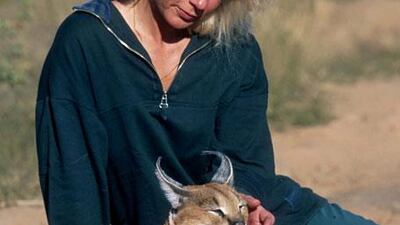I'm the director of the AfriCat Foundation. Originally from Cape Town, I was in insurance before coming to work at the foundation, which is a private conservation body based at Okonjima in north-central Namibia. In the early 1990s AfriCat began as a welfare organisation for the country's big cats, which were targeted by sheep and cattle farmers. So far it has rescued nearly 1,000 cheetahs and leopards, with more than 85 per cent returned to the wild. The focus today is more on education, rehabilitation and research, much of it funded by tourism. Paying guests at the lodges can view the cats in their natural environment as well as see the work of AfriCat, the income from which helps with running costs.
I'm 42 and have been here 12 years. I used to come on holiday but it got difficult to go home. Initially, Namibia was too remote for a city girl but the open spaces and abundant wildlife grew on me. I started in the office but soon started feeding and tending the sick and little ones. Now the animals are my life. I have hand-reared and cared for cheetahs, leopards, wild dogs, jackals, warthogs and a striped polecat.
No two days are the same, except that all the animals need to be fed and waters checked. As soon as I plan to do a task, something else distracts me - a cat with an injury, a cat won't eat, a cat has jumped into another enclosure or the cheetahs are fascinated by a snake. There is office work - answering letters, writing proposals for funding and bookkeeping - but new cubs or pups need to be bottle-fed every four hours and in between you're steaming, mincing or liquidising the next meal or sterilising and cleaning bottles. As they get older they spend less time sleeping and need more entertaining and exercising, so office work takes a back seat. Talking to guests, donors, sponsors and the media takes up part of my time. The cats help raise awareness and spell out conservation priorities to tourists and young Namibians in whose hands their long-term survival depends.
It is certainly easier to raise awareness among visitors when the cause is a graceful, elegant or powerful animal such as the cheetah or leopard. Most people don't see the African Wild Dog as 'sexy', yet they are far more endangered than the cheetah. Unfortunately, when ranchers are in conflict with wildlife, all large carnivores are seen as a threat no matter how beautiful. We have more than 100 large carnivores in our care, from cheetahs, leopards and lions to wild dogs and spotted hyenas so there is much to show people.
If I'd seen it as a regular job I don't think I would have lasted this long. You have to be passionate and not get frustrated at every hurdle. It's never 9 to 5 and you have to deal with anything. We are making a difference. Farmers would routinely trap and shoot leopards and cheetahs because they believed they wantonly killed livestock. It still happens but less so - the message is getting through. It's about educating their children, who will take over. I remember a farmer who'd phone when he'd shot a leopard but one day he called to say he'd caught one alive, could we pick it up? We said what's the catch? He said, 'there isn't one, my kids won't let me shoot it.'

